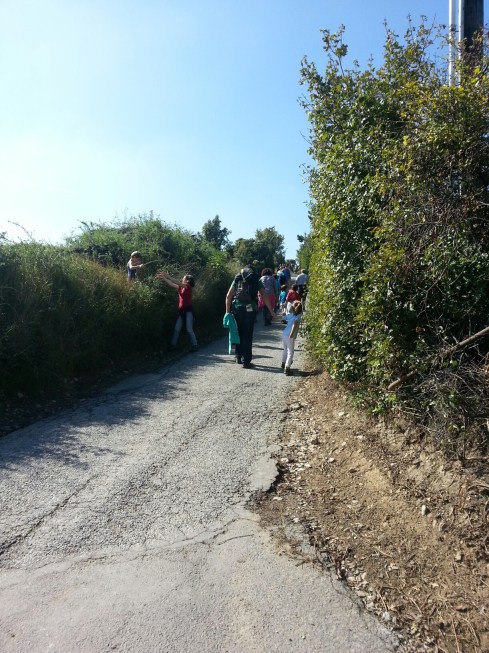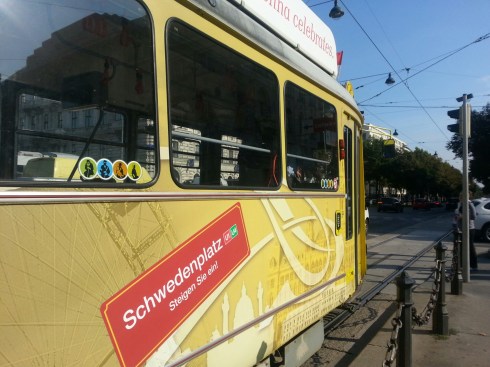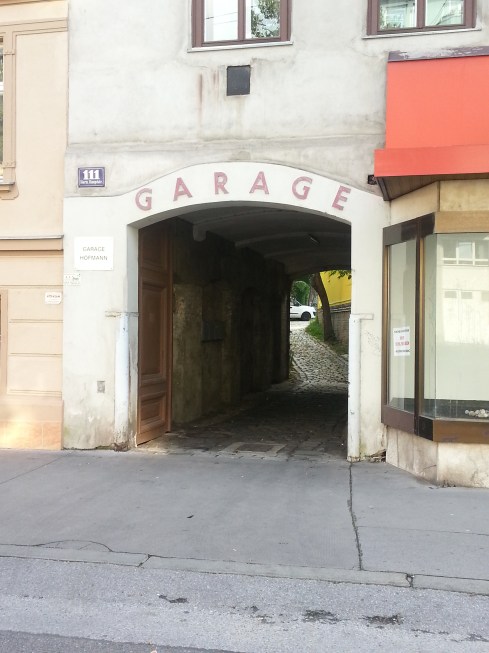I can really tell, where I live, that the semester started today (always much later here than in the USA). Suddenly there aren’t any seats free on the tram, the supermarket is packed at lunch time, and the free newspaper is gone before I get to the tram stop. I still remember my first two months in Vienna, August and September 1988. I thought I had found the perfect city–a spectacular selection of concerts and museums and no need to make one’s way through masses of people. That illusion ended at the beginning of October, when the universities started up again. 😉
Weinwandertag (~wine hike day)
28 SepIt is perfect early fall weather here so Maylo and I expected crowds on Nussberg today. What we hadn’t reckoned on was that today is the annual Weinwandertag, when all the usual Heurigen are open and are supplemented by additional stands along the way. It must be pretty much a record turn out.
Seeing this Maylo and I took the low road and enjoyed a perfect walk for introverts. 😉
“Wie geht’s?”
22 SepOne of the first phrases one learns in any beginning German course, “Wie geht’s?” means “How are you?” Simple, it seems. And yet it is important to know that there is no one-to-one correlation in how those phrases are used in Germany / Austria and the U.S.A.
First of all, in German “Wie geht’s?” by itself is quite informal. Ideally, you remember whether you are “per du” with someone or “per Sie”, the former being the informal you (like “tu” in French) and the latter being the formal you (like “vous”). If you are “per Sie” then the correct phrase is “Wie geht’s Ihnen?”–a German lesson in and of itself including relatively advanced concepts like the dative. If you are “per du” then “Wie geht’s?” by itself is acceptable or you could say “Wie geht’s dir?”
That’s the language lesson associated with that simple phrase. Then there are the intercultural aspects. In German, you only ask the question if you really want to know. This usually means you only ask people you know well, where you are prepared to hear a relatively long and truthful account of their current state of being (no “Fine, thanks, and you?” when someone’s back hurts or life is falling apart). It is acceptable to ask a stranger if there has been some kind of accident and you want to make sure the person is all right, but the general use of “Wie geht’s” simply does not exist here. For example, you would never find a salesperson asking you as you come into the store, even though “Schönen Tag!” (“Have a nice day!”) does seem to have crept into the language.
For years, I had a not entirely earned reputation of being a nice person, because I asked colleagues and clients alike “Wie geht’s” and listened patiently as they chronicled their aches and pains. The danger should one ask and then not listen to the answer is that one is labeled “superficial”–a grave allegation in this relationship-oriented culture.
Because I asked, though, I have also found some answers that have always intrigued me and that are, I believe, typically Viennese. One is “Lei’wand” (short for “Leinwand” or movie screen), which is generally interpreted to mean “Great!” The other goes deeper into the Viennese mindset. Sometimes people, especially those lower down on the socio-economic scale, answer, “Wie die Anderen wollen” or “As the others would have it”, expressing a sense that they do not control their destiny, are subject to the whims of others. So much for “I am the master of my fate, I am the captain of my soul.”
Trams around the Ring
21 SepA number of years ago now the City of Vienna changed the pattern of tram traffic on the Ringstraße. I’m afraid it is my belief, and not only mine, that they only did this to make money (granted, off the tourists, which may make the change more palatable to residents), uncaring of the inconvenience to anyone taking the Ring trams regularly.
That is, in the good old days, there were two lines that went in circles around the first district. You only had to know that the one on the inner ring, the Nr. 1 tram, went clockwise and the one across the Ring on the outer circuit, the Nr. 2 tram, went counter-clockwise. In those days you could get anywhere on the Ring quickly and without changing. And if you were a tourist you could get an overview of this incredibly important thoroughfare for the price of a normal ticket.
Inconvenience Nr. 1: It took me, a regular passenger around the Ring, at least five years to get used to the new patterns. At first I kept ending up in the 4th district when I was trying–late, as usual–to get to the Konzerthaus. In fact, last week I was at Schwedenplatz and a little old lady confided in me that she has lived in Vienna for 90 years and has never adjusted to the change. She wanted to know if the tram she was boarding would take her to the Opera. It would, but just barely, being the one that now trundles off into the 4th.
Inconvenience Nr. 2: There are now a number of places I can only reach by changing twice, where before I only had to change once. (Tip to public transportation authorities: Passengers love this.)
Inconvenience Nr. 3: Where before I had two possibilities for getting to the Konzerthaus, for example, I afterwards only had one (until the 71 was extended to the old Stock Exchange). (Next tip to the public transportation authorities: Passengers love this even more.)
All of this was done, ostensibly, in the name of making life easier for passengers. Hard to believe. I am actually one of the lucky ones. At least for me one trip I take regularly (two or three times a year to visit a friend in the 2nd district) has become easier through the changes.
Why did I mention money at the beginning? Because below is a photo of the travesty now called the “Ring Tram”–a special tram that goes all the way around the Ring, for which you need to buy a special ticket that costs about three times as much as a normal ticket. 😦 Not a good move.
A garage in Hernals
15 SepI’ve been meaning to take a photo of this for years. It is precisely the kind of building that is a perfect example of an earlier time and most likely to be torn down or converted into something else. In this case, although the building is much older, the fact that it is called a garage makes me think of the 1950s, when very few Viennese had cars and quite often they parked them in neighborhood garages, which were more like workshops than more modern parking garages. Mary Stewart describes just such a place in Marseilles in her wonderful romantic thriller Madam, Will You Talk?
And news from another prominent Viennese hotel
14 SepJust a quick note: the Hotel Bristol will be hosting Afternoon Tea with Opera Stars (and, yes, that they’re calling “Afternoon Tea” not “Nachmittagstee”). To celebrate various premieres they are offering a traditional (English, I suppose) afternoon tea with Sekt (or sparkling wine) and a chance to meet (see?) the singers, conductors, and stage directors of the current premiere at the State Opera just across the street.
It costs EUR 49 per person and can be booked by calling +43-1-515 16 555 or by writing to groupsevents.bristol[at]luxurycollection.com. The one of the first opera stars at this Salon Operá is Michael Schade, appearing on 26 September 2014.
Hotel Imperial
14 SepLast week Franz Welser-Möst stepped down from the State Opera House. This week another farewell was reported, just as significant if somewhat more peaceable. Michael Moser, the head concierge at the Hotel Imperial, who himself occasionally uses the old-fashioned word Portier, is retiring after 31 years. Originally from the Austrian province of Carinthia, he has worked half of his life at the Imperial (link to website below), and seems to be perfect concierge material–no surprise there, given the hotel’s reputation. In his interview in the Kurier (sadly I couldn’t find it available for free online) he talks about service, discretion, relationships of many years with the many prominent guests, and the need to know Vienna and what is going on in the city inside out, especially in the days of the internet when guests can do so much research themselves.
In an earlier article he said, “‘Gibt’s nicht’, gibt es nicht”–that is, “‘Doesn’t exist’, doesn’t exist” if you’re concierge at such an establishment. He mentioned that he has a annual membership at the Albertina and the Kunsthistorisches Museum Wien (the Museum of Fine Arts in Vienna) and goes to the opera or theater about 50 times a year–“Because I like it, you understand. Not because I must.” He may go because he likes it, but it also means that when a guest asks him, for example, if the staging of an opera is modern or traditional he can answer. Not to be able to do so would be very embarrassing for him, he said. He also makes a point of finding less prominent spots and events in Vienna so that he can give guests special tips, like when the lilacs are blooming in the St. Marx cemetery (where Mozart is buried in a paupers’ grave) .
He may be retiring from life out front at the Imperial, but he will still be turning up regularly. Apparently,he’s been collecting menus, newspaper articles, funny stories from guests, and so on over the years, just tossing them into a box in his office. He is now going to take some time to sort through the 40 or so boxes he has assembled and bring some system to them. “Not for my sake and not for the sake of the Hotel, but for future generations,” he said, “so that they have something to laugh about.”
Sunday opening hours
14 SepI have left my Grätzl this morning to visit one of my “Viennese nieces” at her weekend job. She works in a bakery, and that in itself tells a story of change–and yet stability–in Austria. One sign of change: when I moved here nothing (except a few designated pharmacies) was open on a Sunday. Ran out of milk? Want fresh rolls for Sunday breakfast? Too bad.
The other sign of change: even now it is very unusual for a student at a Gymnasium (those extremely demanding high schools that are such an integral and quintessential part of Austria’s education system and whose diploma is the sole prerequisite for university entrance here) to have a job during the school year, especially if they don’t need the money. When I first arrived in Vienna it would have been unthinkable.
Then comes the stability: While my niece in the USA, almost the same age, is working every free moment to buy a car, I’m pretty sure my Viennese niece is not planning to use her earnings that way. Somehow I don’t think it would be a top priority even if she lived in the country rather than in this city of exceptionally good public transportation. Indeed, her sister in the meantime has pointed out that she doesn’t even have a driver’s license! 😉
Culture has not yet entirely converged in this globalized world, if, indeed, it ever will.
How could I have missed this?
6 SepIn taking out my Fodor’s to check the information about the bomb damage in the State Opera, I re-discovered an excellent article at the back on Austria’s wines, written by an Englishman named Nicholas Allen, whose day job it is / was to tour Austria with an English-language theater group.
No doubt the entry will need some updating, as 1987 was pretty soon after the international “Weinskandal” (yes, that means exactly what you think it means), but the 1987 article still gives a very good overview of the various regions and varieties, including a mini-glossary of wine terms.
– – – – –
The Austrian wine scandal: When it was discovered that some (although only very few) Austrian winemakers were adding anti-freeze (as I heard it) to their wines to, I’m sorry to say, improve the flavor.
Austrian wines have come a very long way since then!





